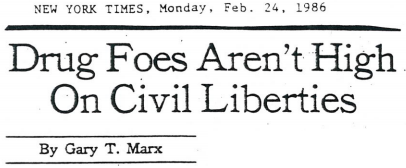
Back to Main Page
Drug Foes Aren't High on Civil Liberties
New York Times, February 24, 1986
By Gary T. Marx | Bio
CAMBRIDGE, Mass — In the novel "Gorky Park," the police inspector asks a central character whom she suspects of having stolen her ice skates. She replies, "Everyone." The inspector responds, "So do I." In the same way, people in our society who advocate the indiscriminate use of drug tests and "lie detectors" appear to suspect everyone.
The list o f those subjected to druge tests seems to grow daily — military personnel, athletes, reporters, computer programmers, bank employees, teachers, airline ticket agents, even high school students. Lie detectors, too, have become increasingly widespread.
One feature of such testing is that it often has a dragnet quality. Everyone is subjected to it. On the surface, this seems equitable. Yet, it poses disturbing problems for civil liberties.
There are flaws in nearly all the major arguments for categorical testing.
- "If you have done nothing wrong, you have nothing to hide." This assumes that a procedure should be judged only by its results. But a fundamental principle of our society is that means as well as ends have a moral component. The argument also assumes that that the innocent suffer no harm from intrusive investigations of questionable reliability. But even if reliability were not an issue, this argument fails to appreciate the reason for privacy. We value envelopes around letters and the confidentiality of spousal communications, not to protect illegality but because liberty is destroyed when such boundaries can be crossed at will.
- "The tests are valid because they are based on neutral scientific measurement." Yet the machines are not infallible; neither are the humans who administer the tests and interpret them. The American Psychological Association has concluded that the polygraph — lie detector — is unsatisfactory. And the drug screening that is most commonly used is often unreliable and not always backed up by more sophisticated second tests. Even then, a variety of factors — ranging from operator inexperience and error, to switched urine, to confounding substances such as over-the-counter weight loss and cold remedies — can distort the results.
- "It's for your own good, because drug use is a medical problem." The millions who use marijuana for the same reasons that others use alcoholic beverages are likely to reject such paternalism. To them, testing is an effort to transfer the on-duty standards of the employer to the off-duty life of the employee. Screening for tuberculosis is not the same as screening for marijuana.
- "It can offer proof of innocence." This turns the traditional American belief that you are presumed innocent until proved guilty upside-down. As one baseball player said, "I don't take drugs and I don't believe I have to prove I don't."
- "It's voluntary." Technically, that's true: You can choose to work somewhere else where categorical testing is not a condition of employment. But it's also disingenuous, especially in an economy where jobs are difficult to find. secretary of State George P. Schultz, who threatened to resign if required to take a polygraph, has career mobility not available to most people.
- "It's legal." This is often the case. But legal controls have simply not had time to catch up to problems the new technology can create. Furthermore, what is technically legal is not necessarily sound social policy.
- "If you question the means, you don't care about the end." This is a classic smear tactic, suggesting — in its most insidious form — that those who question the polygraph and drug screen are somehow favoring espionage and drug abuse. National security and health are obviously important social goals. But precisely because they are so important, great care must be given to the means used to obtain them.
If there is a case for for categorical surveillance (as with airport searches), it is strongest where a seirous problem can be addressed using a test that is highly reliable, specific, minimally intrusive and directly relevant to the problem. Rarely will such conditions be present. Even then, we must be careful that the precedent established does not creep into other unwarranted areas.
You are visitor number  to this page since May 28, 2012. to this page since May 28, 2012.
|
